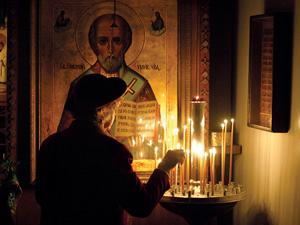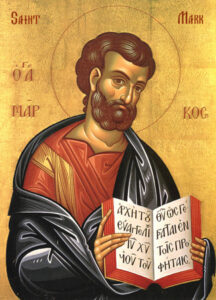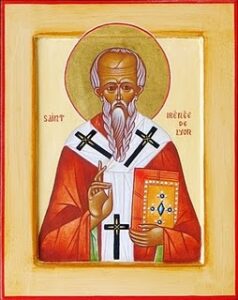I was recently asked to help organize a memorial service for a mutual friend. When I was told that the “Apostle Johnson” would be doing the service, I didn’t know quite what to make of it. I knew of the Apostle Paul who traveled around the Roman Empire planting churches and writing authoritative epistles that churches were obligated to follow. The Apostle Peter was the fisherman who made the famous confession: “Thou art the Christ” and later founded the Church in Rome. Was this modern day “apostle” like the original Apostles? Can there be such a thing as a modern day Apostle?
Protestantism is known for its incredible variety of churches, doctrines, and worship styles. It can be divided into several streams: (1) mainstream churches that have some connection with historic Christianity, (2) Evangelicalism which emphasizes the Bible and being born again, (3) Pentecostalism which emphasizes the baptism in the Holy Spirit, and signs and wonders, and (4) more recently, the New Apostolic Reformation.
C. Peter Wagner, a retired Fuller Seminary professor, wrote extensively about this new movement. He coined the name “New Apostolic Reformation” to describe a trend taking place among African Independent churches, the house church movement in China, and Pentecostal churches in Latin America. He sees all this as part of the ongoing development of new wineskins in church history. “Every time Jesus began building His Church in a new way throughout history, He provided new wineskins.”
Pentecostalism began in the early 1900s teaching the restoration of healing gifts, miracles, and the gift of tongues. This created controversy among Protestants who believed that these gifts ceased with the passing of the original Apostles. Also, where traditional Protestants put the emphasis on the Bible, Pentecostals place emphasis on the Holy Spirit. More recently, there emerged a new teaching that God is restoring the lost offices of church governance, namely the office of prophet and apostle.
The claim for the restoration of the offices of prophet and apostle is significant. The office of pastor and teacher is based upon the careful study of the Bible. There is a certain amount of equality and accountability with the Bible teacher. If one disagrees with the teacher, both sides can study together what the Bible passage says. But how does one respond to: “The Lord told me to do this” or “Thus says the Lord….”? Unless one can claim a similar direct link to the Holy Spirit, how can one challenge this? One runs the risk of defying the direct will of God or worse yet submitting to spiritual deception. The risk in the restoration of the governing ministries is that church authority affects doctrine, worship, and ultimately our relationship with God.
Professor Wagner noticed that many of the New Apostolic Reformation churches are experiencing rapid growth. They have lively worship services full of dedicated members and are engaged in a wide array of ministries. Wagner views this new trend positively. He believes that church history is a story of constant change in which God uses different wineskins (church structures) for different time periods. He notes that where traditional churches are stuck in the past, these new churches are future oriented. But in his description and analysis of the New Apostolic Reformation churches he neglected to say how these churches maintain moral accountability and how they would be able to maintain right doctrine and not go veering off into heresy. What safeguards are in place to ensure that these new churches would not end up becoming bizarre cults under the thrall of an out of control leader?
Apostolic Tradition
The New Apostolic Reformation movement is essentially an off shoot of the Protestant Reformation and as such is based upon the errors of Protestantism. Protestantism teaches that all we need for being a Christian is the Bible alone. This teaching is erroneous. There are passages that teach the divine inspiration of Scripture, the divine authority of Scripture, and inerrancy of Scripture, but nowhere does the Bible teach “the Bible alone.” Another problem with the Protestant doctrine of “the Bible alone” is the question of how we understand and interpret the Bible. Many times the “Bible alone” has resulted in churches and fellowships being built around the personal interpretation of a pastor. So long as the minister up on stage has a Bible in his hand and swears that the Bible is the word of God then it is assumed that what he is teaching must be theologically sound even if it sounds new and different.
The Orthodox Church takes a more biblical approach. It follows Paul’s second letter to the Thessalonians:
Therefore, brethren, stand fast and hold the traditions which you were taught, whether by word or our epistle. (II Thessalonians 2:15)
Here we see two kinds of traditions: oral and written; both are important to the Christian faith. Like the Thessalonians we are called to hold on to and take our stand on the apostolic tradition in both forms. C. Peter Wagner says nothing about apostolic tradition. For him tradition and being traditional means being stuck in the past. It seems that Wagner is more concerned about moving on, moving ahead to something new. But this is not what we find in the Apostle Paul.
In the last days of his life Paul wrote to Timothy several letters. Timothy was his student, assistant, and his successor in ministry. In II Timothy 1:13-14 Paul wrote:
Hold fast the pattern of sound words which you have heard from me, in faith and love which are in Christ Jesus. That good thing which was committed to you, keep by the Holy Spirit who dwells in us. (NKJV)
Paul is intent that his message be passed intact on to future generations. We see this in II Timothy 2:2:
And the things that you have heard from me among many witnesses, commit these to faithful men who will be able to teach others also. (NKJV)
It is important that we understand what is going on here. We are not reading about a typical ordination to the pastorate of a local church. What Paul has in mind here is something akin to the continuing of the apostolic ministry. This special ministry involves the planting of new churches and the supervision of a network of local churches. Here Paul is laying the biblical basis for the office of the bishop.
Church government in the early church was episcopal — under the rule of the bishop, the successor to the apostles. It was not congregational – where each local church was autonomous. Nor was it presbyterian – where a local network of churches would come together to decide matters of faith and practice. It was episcopal because this was the practice of the apostles and the early church. Doctrine was not decided on by the local churches; it was received through a chain of apostolic tradition. This way the Christians were assured that what they believed was the true teaching of Christ.
As the early church spread across the vast Roman Empire it remained unified in doctrine, worship, and leadership. Irenaeus of Lyons, who lived in the second century, wrote:
Having received this preaching and this faith, as I have said, the Church, although scattered in the whole world, carefully preserves it, as if living in one house. She believes these things [everywhere] alike, as if she had but one heart and one soul, and preaches them harmoniously, teaches them, and hands them down, as if she had but one mouth.
One could not be a Christian apart from belonging to the Church. In the early Church there was no such thing as an independent Christian. Nor was there such a thing as a Protestant Christian who relied solely on the Bible for guidance in faith and practice. This high view of the Church is rooted in Scripture. Paul wrote:
…I write so that you may know how you ought to conduct yourself in the house of God, which is the church of the living God, the pillar and ground of the truth. (II Timothy 3:15, NKJV)
For the past two thousand years the Orthodox Church has faithfully guarded the Apostolic Tradition that Paul passed on to Timothy. For this reason the Orthodox Church today looks very much like the early church described in the historical records. But when Evangelicals and Protestants study the early church they find themselves looking at a church so unlike theirs.
The Fall of the Church Theory
One fundamental premise for Protestantism is the belief that somewhere along the way the early Church left the apostolic teachings and became corrupt and worldly. This is known as the fall of the church theory. The problem with this theory is that no one has been able to pin point the time and place of this crucial transition. No serious church historian teaches the fall of the church. This view is largely held by those with limited theological education.
The early church shared a common faith for the first millennium. Then in 1054 the Church of Rome broke off ties with the Churches of the East. This break came to be known as the Great Schism. Following that tragic event, the Roman Church began to evolve in ways while the Eastern Churches remained unchanged. As the Roman Church moved further and further away from its historical roots, doctrinal innovations began to emerge that would trigger the Protestant Reformation. Where Orthodoxy was deeply troubled by the innovations of the Roman Catholic Church, it was even more disturbed by Protestant innovations. Despite the Protestant claims to be a reformed church and much like the early church, Orthodoxy would have none of that. It has charitably labeled Protestants heterodox or more bluntly heretical.
Protestantism is based upon an ongoing quest for the true church. There is the belief that the church must continually undergo reformation. C. Peter Wagner understood church history to be very fluid and evolving, that God builds his in different ways using different kinds of wineskins for each period. He sees the New Apostolic Reformation as the latest stage of church development. But for the Orthodox there are features of the New Apostolic Reformation that resembles the old heresies that the Orthodox Church combated in her early days.
An Old Heresy?
One of the earliest heresies was the heresy of Gnosticism. The Gnostics believed that physical matter was inferior to the spirit realm. They did not outright reject the church or the bishops but believed that they possessed a secret superior knowledge (gnosis). They believed that because the bishops’ teaching authority rested on the institutional authority it was inferior to theirs which was based on divine illumination by the Holy Spirit and by a secret esoteric theology.
One must be careful when comparing the New Apostolic Reformation movement with ancient Gnostic heresy. From what I’ve read in C. Peter Wagner many of the New Apostolic Reformation church leaders have not gone to the extreme of denying the Incarnation. But it appears to me that Gnostic ideas do influence the way they understand the church, church authority, worship, and doctrine.
One of the basic Gnostic beliefs is a dualism that makes the physical and institutional inferior to the spiritual. This is especially evident in the way Protestants and the New Apostolic Reformation movement view the capital “C” Church. Orthodoxy believes that the one true Church is a visible Church evidenced by the local church gathered around the Eucharist, the confession of the Creed, and the office of the bishop. Protestants and the New Apostolic Reformation followers believe that all these are non-essential externals. They believe that the capital “C” Church is the invisible church. For them the outward form does not matter as much as the inward faith in Christ.
The New Apostolic Reformation churches claim to have restored the ministries of the prophets and apostles. But it seems that their new apostles come out of nowhere. They make no claim to being part of a historic chain of succession. They claim to be apostles because of the anointing of the Holy Spirit and because of this anointing they have authority over churches. However, it must be kept in mind that even in Paul’s time there was the danger of false apostles (see II Corinthians 10-12). In the early Church one could not just say, ‘The Lord has called me to be an apostle.’ The apostolic ministry was a foundational ministry; it was based upon having been in Jesus’ company, hearing him teach, and being a witness to the risen Christ. None of the new apostles can make this claim as Jesus’ earthly life and ministry took place two thousand years ago.
The Orthodox Church rests upon a chain of Apostolic Tradition received by the bishops from their predecessors. Apostolic succession in Orthodoxy is not done in secret. One of the clergy is selected and elevated to the office of the bishop. The elevation of the priest to the office of bishop is a public event. Irenaeus of Lyons wrote:
The tradition of the apostles, made clear in all the world, can be clearly seen in every church by those who wish to behold the truth. We can enumerate those who were established by the apostles as bishops in the churches, and their successors down to our time, none of whom taught or thought of anything like their [the Gnostics] mad ideas (AH 3.3.1, Richardson 1970:371).
A modern person can laugh at the idea that the Orthodox Church keeps a list of bishops that goes back to the original Apostles, but why are they laughing? Is it because they find the idea of lists and institutional order inferior to the exciting new apostle they just heard at a mass rally? A rally full of lively music and stirring preaching may be emotionally fulfilling but is this the truth? Truth is not based on feelings but on fact.
There is a crisis of truth in contemporary Protestantism. For many Christians a church or teaching is true because: ‘I can feel it inside me’ or ‘I feel the Holy Spirit speaking to me’ or ‘I felt convicted by the Spirit.’ Orthodox Truth is based upon the historicity of the Incarnation. The Orthodox Church is committed to keeping the Apostolic Tradition without change until the Second Coming of Christ.
So, if an Orthodox Christian were to meet one of the so-called new apostles, his response would be: (1) that there is only one holy catholic and apostolic church and that church is the Orthodox Church, (2) his bishop is a true successor to the original Apostles, and (3) unless one is in communion with the Orthodox Church one is outside the true Church. Outside of this chain of apostolic succession there can be no apostolic ministry. The original Apostles laid the foundations in the first century and the Orthodox Church has been faithfully building on that foundation for the past two millennia. What the so-called New Apostles are attempting to do is to create another church, not return to the original church. Because these so-called new apostles are false those who follow their teachings are susceptible to heresy and spiritual deception.
Another Old Heresy?
Another early heresy was the Montanist heresy. This group was also known as the “New Prophecy.” Montanus, a convert to Christianity in the second century, believed that he was a prophet of God. He taught that the Second Coming was about to happen and that this was signaled by the outpouring of the Holy Spirit. The Montanist movement practiced speaking in tongues and prophetic utterances. In response to the growing formalization of the church Montanus and his followers sought to emphasize the spiritual aspects of Christianity. They believed that they were the elite ‘spiritual’ Christians and would be part of the New Jerusalem. Where the orthodox bishops interpreted Scripture based upon a tradition received from the Apostles, the Montanists relied on prophetic utterances from the Holy Spirit believing that these cleared up ambiguities in Scripture. Thus, the Montanist prophets presented a teaching authority independent of the bishops. It also threatened to move the early Church from a teaching authority based on apostolic tradition to one based on prophetic utterances and visions.
An Eastern Orthodox Response
It appears that the New Apostolic Reformation movement encourages new prophetic teachings independent of the historic Church. Having no anchor in the history and tradition of the Church, they are at risk of drifting into false teachings. Another weakness is that more emphasis is given to self-fulfillment than to holy living and denying the passions of the flesh. One of the biggest draw of the New Apostolic Reformation church services is that they are packed with people, lively praise music, and stirring Bible teachings. People leave these services on a spiritual high. But is that the purpose of Christian worship? Where is the call to repentance and holy living?
The preaching of the forgiveness of sins detached from the call to repentance and to holy living is a serious distortion of the Good News of Christ. At the heart of the Gospel and Christian discipleship is the Cross. Jesus said:
If anyone desires to come after Me, let him deny himself, and take up his cross, and follow Me. For whoever desires to save his life will lose it, but whoever loses his life for My sake will find it. (Matthew 16:24-25, NKJV)
True Christianity is about truth; it is not about what makes me feel good. True Christianity is also about Christ dying on the Cross and our dying with him. Only in dying with Christ will we become sharers in his resurrection. The kingdom of God is based upon the true teachings of Christ. It is open to investigation and study. The Orthodox Church has a historic link that goes back to the original Apostles. This is something that neither the Protestants, the Evangelicals, the Pentecostals, nor the New Apostolic Reformation can claim. In response to the Gnostic heretics, Irenaeus presented the true Gnosis (Knowledge) that is in Christianity:
This is true Gnosis: the teaching of the apostles, and the ancient institution of the church, spread throughout the entire world, and the distinctive mark of the body of Christ in accordance with the succession of bishops, to whom the apostles entrusted each local church, and the unfeigned preservation, coming down to us, of the scriptures, with a complete collection allowing for neither addition nor subtraction, a reading without falsification and, in conformity with the scriptures, so interpretation that is legitimate, careful, without danger of blasphemy (AH 4.33.8, Grant 1997:161).
Conclusion: Broken Wineskins and Spiritual Drunkenness
The other problem is that of spiritual drunkenness. Many people are drawn to the New Apostolic Reformation churches because they provide powerful worship experiences. Oftentimes Pentecostals and charismatics describe worship in terms of getting high on God. But there is a danger here of becoming dependent on spiritual highs. What happens when one no longer gets a spiritual high in worship? What happens when one enters into a spiritual desert? In the story of the Prodigal Son the younger son left home and had a great time spending his inheritance money. The good times lasted only so long then famine struck and he was reduced to extreme poverty. When he hit rock bottom, he came to himself and realized that he needed to go back home. Many people in the New Apostolic Reformation are having a great time right now and have no interest in Orthodoxy but when they get tired of the superficiality of charismatic worship or when they can’t get the spiritual highs like before the time may come for them to consider the Orthodox Church.
Many charismatics won’t enjoy Orthodox liturgy the first time; this is much like an alcoholic drinking clean water after drinking from the bottle for a long time. Unlike charismatic worship which emphasizes spiritual high, Orthodox worship emphasizes spiritual sobriety. The soberness of Orthodox worship brings clarity and stillness of spirit that leads to spiritual wisdom and transformation. “Blessed are the pure in heart for they shall see God.”
Robert Arakaki
References
AH = Adversus Haeresis “Against the Heretics” by Irenaeus of Lyons.
Robert M. Grant, trans. 1997. Irenaeus of Lyons. London and New York: Routledge.
Wagner, C. Peter. 2009. “C. Peter Wagner Explains the New Apostolic Reformation.” Talk To Action: Reclaiming Citizenship History and Faith. By Bruce Wilson. http://www.talk2action.org/story/2009/5/28/19033/8502 Visited 20 December 2011.





Recent Comments